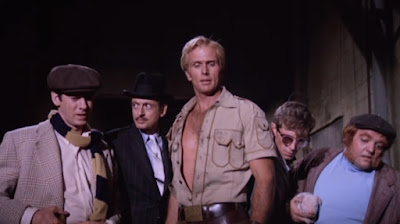But "Doc" Savage (real name: Clark Savage Jr.),apart from the dark edge of the stories, had a shining bright side—a giddily altruistic hero, scientist, inventor, surgeon, biologist and all-around paragon of virtue and athleticism, a soldier-of-fortune without need of wealth, altruistic to the point of not considering romance (despite opportunity) to protect any loved ones from being a target for revenge.
This doesn't stop him from surrounding himself with a devoted clutch of idiosyncratic specialists who serve as both Dei ex Machina and comic relief when Doc gets in a jam. personally or professionally. For this reason—"The Fabulous Five" as they're nicknamed—if anybody does another Doc Savage adaptation (and there are talks of Dwayne Johnson being approached as a sort of "Rock" Savage), it is going to be very crowded.
If anyone does another Doc Savage film, the 1975 version is a must-see...for what not to do. The last film to be produced by the ingenious producer-director George Pal (The War of the Worlds, The Time Machine, Destination Moon, The Seven Faces of Dr. Lao, to name a few), the film is a-clutter with his design sense, but none of his sensibility. Whatever genre Pal put his imagination to—science fiction, fantasy, puppetry—there was a seriousness of purpose, even for a project as rife with puerile pot-holes as Robinson Crusoe on Mars.
This was 1975, the year before the U.S. bicentennial, but two years after the resignation of President Richard Nixon before he could be impeached. In the years after Watergate, cynicism about anything, let alone altruism, was the easy answer—the knee-jerk reaction—of the day. Heroes were not to be believed, but, rather mocked, not just because they were "too-good-to-be-true," but because such a "goody-goody" attitude was naive...and stupid. After all, If you can't trust your President, who can you trust? Roger Moore was James Bond (Moore didn't believe in that type of hero and played him as such). And in a litigious society, where everybody is "lawyered up," and PR is a major industry in a perpetual "spin-cycle" to make their shady clients look good, the mere appearance of honesty leaves one suspect.*
Directed by Michael Anderson, who always seemed to make any film, no matter the budget, look a little cheap-jack, Doc Savage: Man of Bronze engenders worrisome thoughts from the get-go. A tiny American flag gyrates over a frozen wasteland. That flag is attached to a snowmobile, one embossed with a "Doc Savage" logo on it (apparently all of his vehicles, be they cars, autogyro's, what-have-you, will have it) as it approaches a perfectly made igloo on the snow surface. Doffing his parka-hood, Ron Ely makes his first appearance, revealing a shock of blond hair and a literal, animated twinkle in his eye as Narrator Paul Frees intones "This is Doc Savage...The Man of Bronze!" Then the music comes up—the subsequent title will say "Music by John Phillip Sousa" specifically "The Thunderer" as it is adapted by Frank DeVol—a fine craftsman, but even he can't do anything with something that's 100% joke material.
Oh, good Lord. The thing sets out to "out-camp" the "Batman" television series from the 1960's. Some of that is part of the "'Doc' Savage" appeal—for instance, check out the "Code of Doc Savage" below. My favorite line in it is a perfect example, as Savage explains to the female lead (Pamela Helmsley, not the most expressive of actresses unless she was playing "the bad guy") why he can never have a woman in his life after she has suddenly (and somewhat inexplicably) blurted out her love for him. "I understand," she says, betraying just a hint of disappointment behind her stoicism. Doc gently cuffs her chin and says amicably, "Mona...you're a brick." I seem to remember that line from the book and chortling over it, but, how "camp" is that?
Ron Ely plays Doc Savage the way Charlton Heston played everything. Given the circumstances and the silliness with which the whole thing is presented, he could have taken "camp" lessons from Adam West, who at least managed to "play straight" while always letting you know he knew there was a joke going on. The main villain is played by Paul Wexler, who seems to have no appetite for scenery-chewing (which is disappointing, especially when one of the villains has the habit of sleeping in a crib) or maybe he just didn't know how to do it entertainingly. The whole thing is horrendously "dubbed" the sets look cheap, the locations very "back-lot" and one has to put the blame on Anderson, who even managed to make his next film, Logan's Run, look cheap despite a budget of nine million dollars (Compare it to Star Wars which was made a year later for 13). Whatever is clever in the movie can be sourced to the novel—Doc's amazing inventions, for instance—but, in the year in which Jaws was released, Doc Savage: The Man of Bronze bombed horribly at the box-office.
Like so much of what passes for humor in movies these days, you have to be a little bit high, or in some other way impaired, in order to appreciate this film—any number of pharmaceuticals and concoctions can be used to lower the bar—and taste—sufficiently. But, look, if you can make a series of "Indiana Jones" parodies of B-movie serials, Lara Croft video-game movies, you can certainly make a serious (if tongue in cheek) version of the "Doc Savage" series and do it somewhat competently.
 |
| The film ends with this title card—part of it was filmed but shelved when The Man of Bronze did poorly at the box-office. Still, the second film boasted a screenplay by Phillip Jose Farmer, which one can only see as a missed opportunity. |









No comments:
Post a Comment